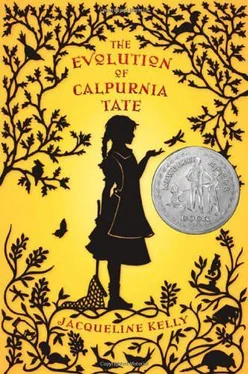Jacqueline Kelly - The Evolution of Calpurnia Tate
Здесь есть возможность читать онлайн «Jacqueline Kelly - The Evolution of Calpurnia Tate» весь текст электронной книги совершенно бесплатно (целиком полную версию без сокращений). В некоторых случаях можно слушать аудио, скачать через торрент в формате fb2 и присутствует краткое содержание. Город: New York, Год выпуска: 2009, ISBN: 2009, Издательство: Macmillan : Henry Holt and Company, Жанр: Детская проза, на английском языке. Описание произведения, (предисловие) а так же отзывы посетителей доступны на портале библиотеки ЛибКат.
- Название:The Evolution of Calpurnia Tate
- Автор:
- Издательство:Macmillan : Henry Holt and Company
- Жанр:
- Год:2009
- Город:New York
- ISBN:978-0-8050-8841-0
- Рейтинг книги:5 / 5. Голосов: 1
-
Избранное:Добавить в избранное
- Отзывы:
-
Ваша оценка:
- 100
- 1
- 2
- 3
- 4
- 5
The Evolution of Calpurnia Tate: краткое содержание, описание и аннотация
Предлагаем к чтению аннотацию, описание, краткое содержание или предисловие (зависит от того, что написал сам автор книги «The Evolution of Calpurnia Tate»). Если вы не нашли необходимую информацию о книге — напишите в комментариях, мы постараемся отыскать её.
The Evolution of Calpurnia Tate — читать онлайн бесплатно полную книгу (весь текст) целиком
Ниже представлен текст книги, разбитый по страницам. Система сохранения места последней прочитанной страницы, позволяет с удобством читать онлайн бесплатно книгу «The Evolution of Calpurnia Tate», без необходимости каждый раз заново искать на чём Вы остановились. Поставьте закладку, и сможете в любой момент перейти на страницу, на которой закончили чтение.
Интервал:
Закладка:
“Here,” he said, and held it out to me.
He tipped it into my palm, and I’m proud to say I didn’t flinch. The beetle tickled as it wandered over my hand.
“Should we keep him, sir?” I asked.
“I have one in my collection in the library. We can let this one go.”
I put my hand to the ground, and the bug or, rather, Cotinus texana stumbled off and wandered away unconcerned.
“What can you tell me about the Scientific Method, Calpurnia?” The way he said these words, I knew they had capital letters.
“Um, not much.”
“What are you studying in school? You do go to school, don’t you?”
“Of course I do. We’re studying Reading, Spelling, Arithmetic, and Penmanship. Oh, and Deportment. I got an ‘acceptable’ for Posture but an ‘unsatisfactory’ for Use of Hankie and Thimble. Mother was kind of unhappy about that.”
“Good God,” he said. “It’s worse than I thought.”
This was an intriguing statement, although I didn’t understand it.
“And is there no science? No physics?” he said.
“We did have botany one day. What’s physics?”
“Have you never heard of Sir Isaac Newton? Sir Francis Bacon?”
“No.” I wanted to laugh at this ridiculous name, but there was something about Granddaddy’s expression that told me we were discussing mighty serious business and he would be disappointed in me if I didn’t take it seriously, too.
“And I suppose they teach you that the world is flat and that there are dragons gobbling up the ships that fall over the edge.” He peered at me. “There are many things to talk about. I hope it’s not too late. Let us find a place to sit.”
We resumed our walk to the riverbank and found shade under a hospitable tree in the pecan bottom. Then he told me some stupefying things. He told me about ways in which you could get to the truth of any matter, not merely sitting around thinking about it like Aristotle (a smart but confused Grecian gentleman), but going out and looking with your own eyes; about making your Hypothesis and devising your Experiment, and testing by Observation, and coming to a Conclusion. And then testing the strength of your Conclusion, over and over. He told me about Occam’s razor, about Ptolemy and the music of the spheres, and how everyone had been all wrong about the sun and the planets for so many centuries. He told me about Linnaeus and his system for naming all living things in Nature and how we still followed this system whenever we named a new species. He told me about Copernicus and Kepler and why Newton’s apple fell down instead of up. About how the moon is always falling in a circle around our Earth. About the difference between deductive and inductive reasoning and how Sir Francis Bacon of the peculiar name got it right. Granddaddy told me how he had traveled to Washington in 1888 to join a new organization of gentlemen who called themselves the National Geographic Society. They had banded together to fill in the bare spots on the globe and to pull the country out of the morass of superstition and backward thinking in which it floundered after the War Between the States. All of this was heady news of a world far removed from hankies and thimbles, patiently delivered to me under a tree amidst the drowsing bees and nodding wildflowers.
The hours passed, and the sun moved overhead (or to be correct, we moved below it, rotating slowly away from the day and toward the night). We shared a thick cheese-and-onion sandwich and a wedge of pecan pie and a canteen of water. Then he took a couple of nips from his silver flask, and we napped awhile as the insects buzzed and ticked and the dappled shade shifted around us.
We awoke and dipped our handkerchiefs in the river to refresh ourselves, then poked our way along the bank. I caught various crawling and swimming and flying oddities at his direction, and we examined them all, but he kept only one insect, putting it in a Mason canning jar with holes poked in the lid, which I knew had come from our kitchen. (Viola constantly complained to Mother that her jars were disappearing, and Mother in turn always blamed my brothers, who were—as it turned out for the first time in recorded history—blameless.) There was a small, neat paper label pasted on the jar. I penciled the date and time of collection on it as instructed, but I didn’t know what to put for the location.
“Think about where we are,” Granddaddy said. “Can you describe it concisely so that you can find this spot again if you have to?”
I looked at the angle of the sun through the trees and thought about how far we had walked. “Can I put one half mile west of the Tate house, near the three-forked oak?”
Yes, that was fine. We wandered on and found one of the regular deer paths dotted with droppings. We sat down and waited in silence. A white-tailed doe came by, making no sound. I could almost reach out and touch her. How could such a large creature move so silently through the snapping underbrush? She turned her long neck and looked right at me, and for the first time I understood the expression “doe-eyed.” Her deep brown eyes were huge, her gaze gentle and melting. Her large ears flicked in all directions, independent of each other. A shaft of sunlight caught the blood-rich ears and turned them a brilliant pink. I thought she was the most gorgeous creature I’d ever seen, until a few seconds later her spotted fawn meandered into view. Oh, the fawn broke my heart with its sweet, dished face, its absurdly fragile legs, its still-fuzzy coat. I wanted to scoop it up in my arms and protect it from its inevitable future of coyotes, starvation, hunters. How could anybody shoot such a beauty? And then the fawn did this miraculous thing: It folded up its front legs, then its hind legs, and sank to the ground where it . . . disappeared. The white spots scattered over its brown back mimicked the dappled light so that one second a fawn lay there, and the next second there was nothing but undergrowth.
Granddaddy and I sat motionless for a good five minutes and then quietly collected our things and moved on. We followed the river until the shadows grew long and then we arced through the scrub and made for home. On the way back, he spotted the rarest and most delicate object in the wild, an old hummingbird’s nest, fragile and expertly woven, smaller than an eggcup.
“What extraordinary good luck!” Granddaddy said. “Treasure this, Calpurnia. You may go through your whole life and never see another one.”
The nest was the most intricately constructed thing, like something built by the fairies in my childhood tales. I almost said so aloud but caught myself in time. Members of the scientific community did not say such things.
“How can we carry it home?” I said. I was afraid to touch it.
“Let’s slide it into a jar for now. I have a glass box in the library that will be the right size. You can keep it on display in your room. It would be a shame to hide it away in a drawer.”
The library was so much Granddaddy’s territory that even my parents seldom went in there. SanJuanna was allowed to dust once a quarter. Granddaddy usually kept it locked. What he didn’t know was that on those rare occasions when there were no adults around, my brothers would sometimes boost each other over the transom. My second-oldest brother, Sam Houston, once got a long look at Mathew Brady’s book of battlefield photographs and breathlessly reported to us the butchered horses lying in the mud and the shoeless dead men staring at the sky.
We got back to the house around five o’clock. Jim Bowie and Ajax ran out to greet us as soon as they saw us coming up the drive.
“You’re in trouble, Callie,” J.B. puffed. “Mama’s really mad.” He ignored Granddaddy. “Mama says you missed your piano practice today.”
Читать дальшеИнтервал:
Закладка:
Похожие книги на «The Evolution of Calpurnia Tate»
Представляем Вашему вниманию похожие книги на «The Evolution of Calpurnia Tate» списком для выбора. Мы отобрали схожую по названию и смыслу литературу в надежде предоставить читателям больше вариантов отыскать новые, интересные, ещё непрочитанные произведения.
Обсуждение, отзывы о книге «The Evolution of Calpurnia Tate» и просто собственные мнения читателей. Оставьте ваши комментарии, напишите, что Вы думаете о произведении, его смысле или главных героях. Укажите что конкретно понравилось, а что нет, и почему Вы так считаете.












